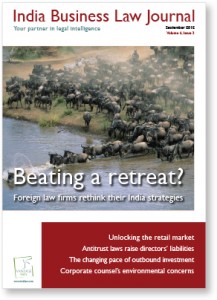“No power on earth can stop an idea whose time has come”
These words, penned by Victor Hugo, were famously quoted in 1991 at the start of India’s liberalization programme by the then finance minister who is now the prime minister, to describe what he saw as the inevitable emergence of the country as a major economic power.
More than 20 years later, following months of dithering over effecting changes in policy, Manmohan Singh has once again initiated the further opening up of the economy. However, this time the rhetoric is less stirring.
“The time for big-bang reforms has come, and if we go down, we will go down fighting,’’ the prime minister is reported to have told his cabinet colleagues when he recently persuaded them to back a new round of opening up of India’s retail and airline sectors, and a few others, to foreign investment. This more combative language is indicative of the rough road ahead before investors and the country realize the benefits of these reforms.

As we detail, other markets in the region can offer high-value deals with less fee pressure and as a result international law firms are increasingly turning their attention to countries such as Indonesia, where profitability per deal is often higher. But there is little doubt that in the long run India is a compelling business story and international firms continue to wait on the sidelines for the economy to pick up.
While business continues as usual in India, complying with the country’s environmental laws is a growing area of concern. Failures to demonstrate environmental compliance have sparked protests that have damaged investors’ reputations and derailed projects. In Green trails or trials (page 29), seven lawyers with particular expertise in the country’s environment laws respond to questions from corporate counsel on current legislation, the challenges of obtaining clearances and more.
India’s increasingly stringent antitrust regime is another area of concern. With all sections of the Competition Act, 2002, now in force, companies are increasingly wary of attracting the attention of the Competition Commission of India (CCI). As a first step – as detailed in Playing by the Rules in the July/August 2012 issue of India Business Law Journal – they should put in place a compliance programme.
However, as highlighted in The buck stops here, directors and senior managers also need to be aware that they could be held personally liable in case of violations of competition law rules. While the CCI has yet to proceed against individual directors or executives of a company, nothing prevents it from doing so. Now may be a good time to put in place safeguards – as suggested in our coverage – against any such action.
Over the past few years many foreign retailers have entered India through third-party relationships involving franchise arrangements. However, this route is not without its challenges and, as we explain in Finding a way in , several of these result from India’s unique market situation. Major challenges include safeguarding IP rights and enforcing post-contractual non-compete provisions against a former developer.
To provide insights into the setting up of a franchise agreement, we tapped into the experience of Gloria Jean’s Coffees, which has 1,000 outlets across 42 countries. Seshani Bala, international counsel for this Australian company, says issues that came up during negotiations with the Indian party have been used as a precedent to handle similar agreements in Turkey and Azerbaijan – a clear indication that there are lessons to be learned from Gloria Jean’s experience.
In-house counsel in all types of companies across India are increasingly being called on to be business enablers. Ashok Sharma, general counsel of MMTC and the founder-president of the Indian Corporate Counsel Association, writes in Vantage point : “In-house counsel must be able to offer strategic solutions and alternatives to ensure that legal compliance does not stifle business goals.” Theirs is clearly a challenging role, especially given the global ambitions of many Indian companies.
As we report in Sober optimism , India Inc has been venturing out of the country, albeit cautiously while uncertainty reins in global markets. The business imperatives that currently drive Indian companies are likely to result in investments that provide long-term growth. This is a change from earlier transactions that in several cases are now being seen as either wayward or too expensive. “Some early outbound investments in mid-cap companies haven’t worked – their cash flows were not healthy and they lacked management bandwidth to turn it around,” remarks investment banker Rajeev Gupta at Arpwood Capital.
Clearly, foreign investors drawn to India by the recent relaxation in foreign investment norms will be wary of making similarly wayward and expensive investments.



























